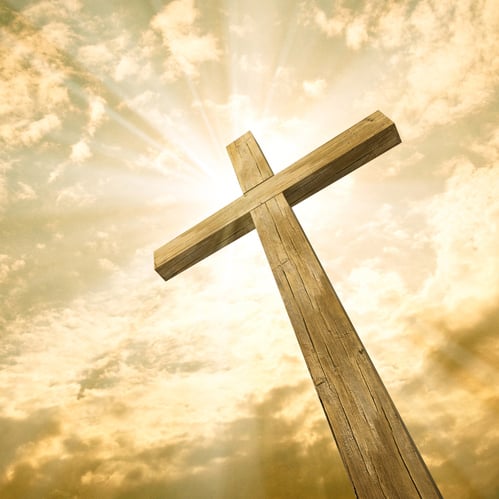
Rose Folsom questioned the value of suffering, until she looked more closely at the words and example of Jesus.
St. Paul hinted at the difference between “the Cross of Christ” and “the world’s cross” when he observed that “we proclaim Christ crucified, a stumbling block to Jews and foolishness to Gentiles” (1 Corinthians 1:23). Both Jews and pagans considered the “victory of the cross” to be an absurd notion — because it contradicts both heavenly and earthly hopes, when viewed without faith.
Paul proclaimed that faith in the resurrected Christ is the only way to understand the True Cross that connects us with an eternal heaven:
If Christ has not been raised, then empty is our preaching; empty, too, your faith. ... If for this life only we have hoped in Christ, we are the most pitiable people of all. (1 Corinthians 15:14,19)
Jesus warned that “without me you can do nothing [of eternal value] (John 15:5).” And what does he mean by that? He goes on to explain that uniting with Him means to “remain in my love” (John 15:9). And true love sometimes hurts. That’s the true cross that Jesus asks us to carry.
Is there a false cross?
If we believe the faith we proclaim in the Creed, then do why we need to worry about carrying a false cross? It’s because we are sinners in a fallen world and we are all too liable to fall for the lie that we are self-reliant and can carry our burden without Jesus’ help—as in, “Never mind, God, I got this!”
And too often we bring needless suffering on ourselves by our bad choices that maybe could have been better if we had prayed first. Like the time I tried to help someone get off drugs, who turned out to be a perpetual help-seeker and who had no intention of turning his life around. Healthier boundaries would have kept me from “going down the drain” with him into a pit of misery — all brought about by not doing things God’s way. The pride of thinking we can “fix” other people is a false cross. The true cross is walking with the wounded as God heals them.
The shocking news
Peter was shocked. He protested when Jesus told him he should let Jesus wash his feet. When Jesus explained that “What I am doing, you do not understand now, but you will understand later,” Peter said to Him, “You will never wash my feet.” Jesus answered him, “Unless I wash you, you will have no inheritance with me.” Simon Peter said to Him, “Master, then not only my feet, but my hands and head as well” (John 13:7-9).
And Peter was beyond shocked by Jesus’ commandment to eat his body and drink his blood, lest he (Peter) have no life in him. Jesus asked whether he would leave, too. Peter responded, “Master, where else shall we go? You have the words of eternal life” (John 6:68).

Be like Peter
Peter was honest about not understanding the painful thing that Jesus was asking. But he always came back to trust in the one in whom “we have come to believe.”
After Jesus’ Ascension, the apostles were mentored by Mary. “She who believed that the Lord’s promises to her would be fulfilled” had been living the true cross in radical trust her whole life, and never more than at Jesus’ crucifixion. Mary stood at the foot of the cross while Jesus demonstrated what sacrificial love, the true cross, looks like. Her heart was pierced with the sword that Simeon foresaw. In His Cross and Resurrection, Jesus showed the whole world how and why to pick up their true cross and follow Him.
The secret to the true cross is that it is the Father’s will. Even if, like Peter, we don’t understand yet. You have my prayers to always take up the true cross that is saving the world. Because eye has not seen nor ear heard the glories that God has prepared for His faithful ones.
Copyright 2021 Rose Folsom
Image: Deposit Photos, licensed by author
About the Author

Rose Folsom
Rose is a convert and Lay Dominican whose background as solopreneur and supervisor makes her passionate about helping professionals live virtues like humility and perseverance so they can ditch imposter syndrome and perfectionism while fully living their faith at work. Grab Rose's latest tips for growing in virtue at VirtueConnection.com.


.png?width=1806&height=731&name=CatholicMom_hcfm_logo1_pos_871c_2728c%20(002).png)
Comments